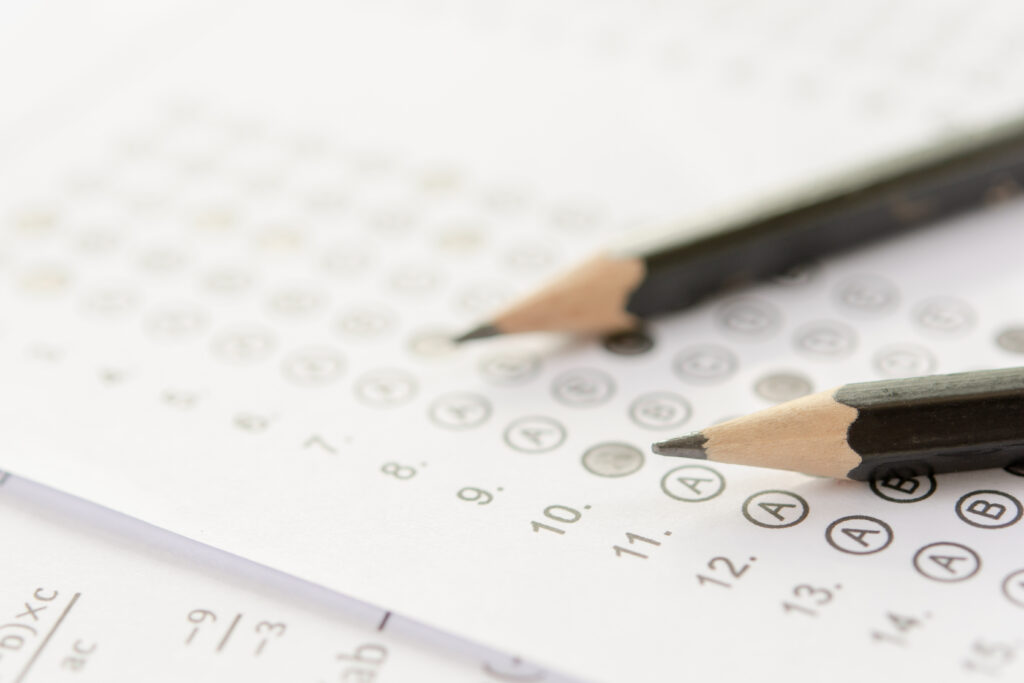Caltech has recently announced that they are changing how they will analyze and weigh test scores from applicants. Many schools are shifting how they weigh and consider test scores as they return to requiring them after ending test-optional policies, but Caltech’s new method is somewhat unique, and therefore bears closer examination and analysis.
In this article, we’re going to first look at what their new system is, and then how this can impact you and your application to Caltech, and if this will have any strategic implications. We’re also going to look at what impacts this might have for the broader admissions landscape, and how this may impact the role of standardized tests in admissions. Let’s jump right in!
How is Caltech Changing Their Use of Standardized Test Scores?
Caltech is one of the colleges which quickly returned to requiring the submission of standardized test scores after the Covid-19 pandemic. They see a clear correlation between how students perform on these tests and the grades they get at Caltech; since one of their goals is to admit students who will succeed in their school, this is of course highly important to them.
This has created a perception amongst students that they need perfect scores in order to apply to and attend Caltech; discouraging some very qualified students from even applying. Caltech has noted this, and thus their new system has been created. In this system, scores are divided in the following ways:
- Scores between 780-800 on the SAT and 35-36 on the ACT will be put into bucket A
- Scores between 750-770 on the SAT and 33-34 on the ACT will be put into bucket B
The scores in bucket A are the ones which correlate with the best academic performance at Caltech once admitted; they see slight differences in perfect and near perfect scores, but not enough to be hugely relevant or impactful. Thus, they feel confident in lumping them together in a single bucket.
Bucket B scores do not perform quite so well as those of bucket A, but still show only a relatively small decrease in grades once they reach Caltech. There is a difference, yes, but a small enough one to not be terribly important to them.
In this new system, students who have scores on individual test sections that fall into these ranges will only have what bucket they are part of shown to admissions officers, without differentiated scores. Students scoring below the cutoff will have their full score for that section will have that score given directly to admissions officers.
Thus, a student scoring an 800 on math and a 720 on reading would be presented to a Caltech admissions officer as being in Bucket A for math, and scoring a 720 for reading. Similarly, a student who scores a 34 on the math section of the ACT and a 32 on reading will be labeled simply as Bucket B for math, and have their reading score given to admissions officers.
Caltech goes out of their way to note that test scores remain one small part of what they consider when making admissions decisions, and are far from the only thing they want from high achieving students. The scores you get are important, yes, but they are not the only thing which matters.
How Does This Impact You?
So Caltech is changing how they review test scores; how does this impact your own application to the school (it doesn’t impact you at all if you aren’t applying of course)? This depends on several factors, the most important being the score you got on your standardized tests.
The buckets they have set out, and the scores they have chosen to include, send a clear message of what standards they have for applicants, and what they want to see from students to be considered competitive. You do not need to score within one of these brackets to get in of course; but they are clearly delineating what they expect from top applicants in a way most universities have not done.
That said, if you scored within one of the buckets for math or science, but not for reading, then you may still consider attending. Caltech does technically offer a liberal arts core to their curriculum, but they are first and foremost a school focused on the STEM subjects. This is part of the reason why they break things down by section, instead of simply putting your combined score into a bucket.
Caltech also superscores their tests, making targeted studying and retaking a very good option, especially if you are on the borderline for one section. Moving up ten points in the SAT is often only a difference of a few questions right or wrong, but now can make all the more difference. Thus, students who are on this border should consider retaking these tests.
Finally, you can’t forget to neglect the rest of your Caltech application. Yes, this is a change, and does indicate how seriously they take standardized test scores. That said, they go out of their way to point out this is not all they want; far from it. Test scores high enough to get into one of these buckets will get you considered as an applicant, but it is the rest of your application which will decide your eventual success.
What Does This Say About Standardized Test Scores Generally?
This move is specific to Caltech, but can tell us something about how colleges view and use standardized test scores generally in their admissions process. Also, depending on how well this process works for Caltech, we may see other universities adopting their methodology; universities often follow each other in admissions trends, especially if they see something working well.
The first thing this tells us is why colleges put such a premium on test scores in admissions. There is some desire for them for their own right; anything which gets factored into US News rankings automatically becomes important. They are also important, however, as a signaller for a student’s academic potential, to demonstrate if they are ready to succeed at a collegiate level.
Every high school’s courses and grades are different, so a student getting excellent high school grades may not be indicative of their overall academic preparation. Standardized tests are, however, standardized, and give admissions officers something of a universal ruler with which to measure students. This is far from perfect of course, but is better than nothing.
Most interesting are the test score ranges Caltech chose for their new bucket system. Colleges have long boasted about having high average test scores, but we’ve never before seen such a clear indication of what scores a college wants from applicants. Now, Caltech does say that you can get in with lower scores, but this is about as clear as they can get in signalling what they are looking for.
Now, what each college wants is different, so this is no guarantee that all top colleges want scores in the exact same range as Caltech. It is a sign, however, of what these colleges expect from top students, and just how competitive they expect applicants to be academically.
A Note on Dartmouth
We do want to give one final note on this, from another top school which gives insight into how they look at test scores. Dartmouth specifies that your test scores are not examined in the context of applicants as a whole, but in the context of your high school. This means your scores may be much more competitive than you think when you simply look at the raw numbers.
These are two different ways to approach the same problem of using test scores in admissions, and finding the students who are best equipped, through academic preparation and motivation, to take on the challenges of college. Each school follows their own internal guidelines on this, but we hope more release disambiguation like Caltech and Dartmouth; we’ll be sure to update you as and when they do.
Final Thoughts
Standardized tests have long been part of the admissions process, and look to remain integral to college applications for a long time to come.Caltech has introduced a new wrinkle, but in many ways this is a good thing, clearly articulating to students what they want, and what they expect. While these expectations are high, having this level of clarity from colleges is rare, and we applaud it when it happens.
The thing students need to worry about now is meeting Caltech’s high expectations, for test scores and otherwise. If you are looking for help getting your own test scores up, then we can help. Our test prep experts know exactly how to help students reach their maximum potential for the SAT and ACT; students we work with see an average SAT score increase of 180 points. Schedule a free consultation with us today to learn more about how we can help you with this, or any other aspect of Caltech’s application process. We’re always happy to hear from you.








